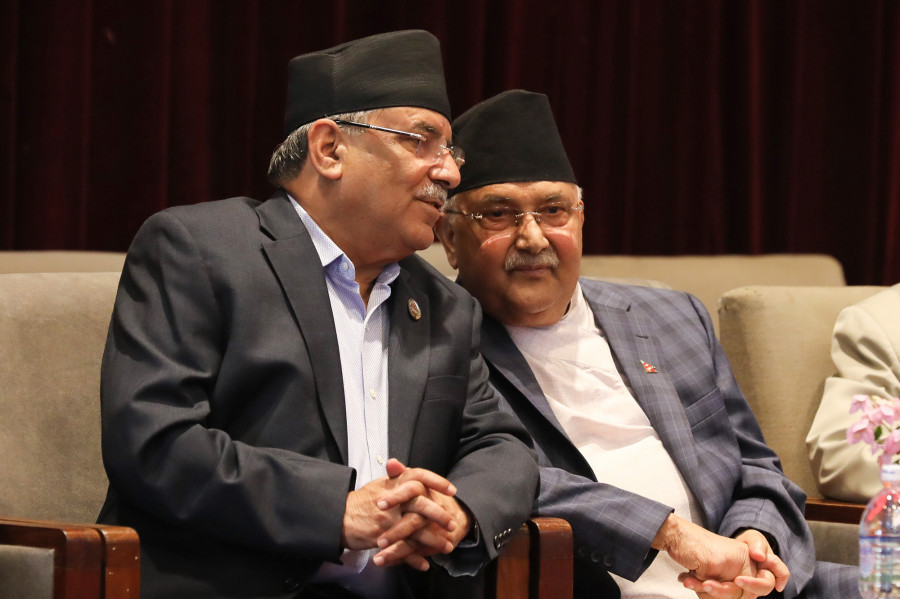Politics
Karnali crisis resolution another example of anti-federalism approach, politicians and experts say
Provincial leaders question the value of elected people’s representatives if the ruling party leadership’s diktat from Kathmandu matters above all.
Anil Giri
The political drama in Karnali has not only highlighted the fault lines in the ruling party and how the top leaders manoeuvre their positions inside it but also how they are trying to weaken the spirit of federalism.
During his meeting with Karnali Chief Minister Mahendra Bahadur Shahi, his challenger Yamlal Kandel and other provincial leaders on Saturday, Prime Minister KP Sharma Oli said that since the provincial governments are the units of the federal government, the provincial governments alone cannot change the ministers, according to a participant at the meeting.
“He said any changes in the provincial cabinet should be made in coordination with the federal government and the prime minister,” said a participant during the briefing.
But Oli’s diktat has not gone down well among politicians and experts.
“Provinces are not subordinate bodies of the centre. They are independent bodies but connected with the centre. Such statements from the prime minister would weaken federalism and disarm federal units. Federal units have to be strengthened,” said Daman Nath Dhungana, former speaker of the House of Representatives and a human rights activist. “But the prime minister’s statement doesn't go by the spirit of federalism. This statement shows how centralised his mentality is.”
The party’s provincial committee plunged into a deep crisis last week after a no-confidence motion against Chief Minister Shahi for incompetence was initiated by 18 ruling party lawmakers led by party’s deputy in-charge and provincial lawmaker Yamlal Kadel.
The crisis was defused after seven of the 18 provincial lawmakers withdrew their support to the motion after some horse-trading on ministerial berths.
The provincial leadership was also summoned to Kathmandu to talk to Oli and the other chair Pushpa Kamal Dahal and told to abide by the decisions of the two Nepal Communist Party (NCP) chairmen.
Kandel, the chief minister aspirant, is unhappy with the latest turn of events.
“What I did was known to the top party leadership. I have told the party leadership about the context of the no-confidence motion,” said Kadel, who is upset over the summons to Kathmandu for resolving a provincial dispute. “Our summoning has put a question mark over the authority and power of elected people's representatives.”
But an advisor to Oli said that the prime minister did not say that the provincial government is an administrative unit of the federal government.
“The prime minister said that they should seek the advice of the centre in matters related to the party, not about governance per se,” Surya Thapa, press adviser to Oli, told the Post. “The problem in Karnali is purely an internal matter of the party so in that context, the prime minister said that provincial leaders should not do whatever they like or think.”
This is not the first time in recent times that the central leadership has imposed its decision on provincial assemblies.
Last month the two chairs instructed Province 5 party members to name the province Lumbini and, more controversially, make Deukhuri as its capital for the sake of balance of power in the party.
General secretary Bishnu Poudel was appointed finance minister after he gave up his stance on having Butwal as the provincial capital.
“Our party has turned into a front for different interest groups,” said Kadel. “Now we have to see the leadership’s stance towards democracy and federalism, and whether or not our leadership is ready to take a decision as per the spirit of federalism.”
The working styles of the two party chairmen have come under attack from within the central office bearers too.
A Standing Committee member close to the Dahal-Madhav Nepal faction said that there is a tendency of imposing decisions by the two leaders and this is also against the spirit of the party’s decentralised decision making process.
“Everything is well and good when Oli and Dahal sit together and take decisions but when an issue affects the larger party, their decisions become controversial and the party becomes hostage to the Oli-Dahal bonhomie because their decisions only benefit them, not other party members,” said the member.
The constitution has clearly drawn the line between federal, provincial and local governments and clearly outlined that all three levels of government are independent in nature to exercise all kinds of power, say experts.
“Since one party has formed governments in all three layers, it does not mean that the prime minister should cross the line set by the constitution because all entities are independent in nature and governments in the provinces and local level are not under the central government, “ said former finance secretary Shanta Raj Subedi.
Subedi had been appointed chairman of the Inclusion Commission but resigned after failing to get enough support from the federal government.
“Oli does not have a good track record on federalism and there are anti-federal thoughts and centralised mindset elsewhere too,” said Subedi. “The constitution has clearly demarcated the rights and duties of all three levels so provincial governments cannot be dictated or become hostage to the central government.”




 17.12°C Kathmandu
17.12°C Kathmandu















